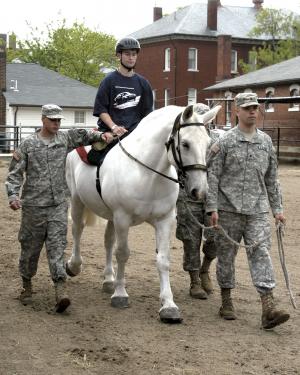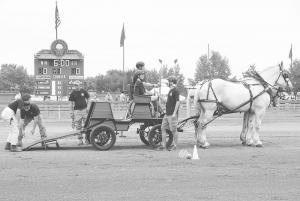2010 - Volume #34, Issue #6, Page #24
[ Sample Stories From This Issue | List of All Stories In This Issue | Print this story
| Read this issue]
"Horses For Heroes" Program Helps Wounded Veterans
 |
 |
Riding horse builds upper body strength, hand-eye coordination, balance and mobility. Equine therapy is also valuable to people with other disabilities, including brain trauma.
A recent addition to the program for more severely wounded vets is a $20,000 custom-built carriage. The carriage has a foldable ramp for wheelchairs and rings/ratchets to hold them in place.
"It has many of the same benefits as riding. They are just riding on a flat surface as opposed to a horse," Pence says, whose Washington, D.C.-based group is called Caisson Platoon Equine-Assisted Program, or CPEAP (www.operationsilverspurs.org/CPEAP.html). Members of the famed Old Guard Caisson platoon, who drive flag-draped caissons to Arlington Cemetery, are assigned to work with wounded soldiers. The program has become an approved therapy option by the Veteran's Administration and wounded vets come mainly from Walter Reed Medical Center.
Since CPEAP started in 2006, horse therapy programs for veterans have expanded to more than 50 sites across the U.S., working within the guidelines of the Horses for Heroes program run by the North American Riding for the Handicapped Association (NARHA). NARHA is certified by the VA to provide therapy to wounded veterans. National Guardsmen or Reservists often volunteer as sidewalkers and assistants.
Most of the therapeutic equine centers depend on volunteers and financial donations to cover expenses.
Marge Gunnar is the founder of BraveHearts Therapeutic Riding & Educational Center in Illinois (www.braveheartsriding.org). "We work with four VA hospitals that bring veterans to us. Veterans don't pay," says Gunnar. BraveHearts has worked with several hundred veterans since 2007. The director of the center is a Vietnam veteran, and many of the committed volunteers are veterans, Gunnar notes.
BraveHearts instructors are NARHA certified. They offer both riding and carriage-driving sessions.
"We have a veteran who has been with us for quite some time. When he first came to us he hadn't been out of his house for eight years. He was a Vietnam vet with PTSD. "He now rides in our drill team, and participates on our calf-penning team," Gunnar says. "He is a vocal spokesman for equine therapy and has become a major recruiter for our program."
Another veteran has traumatic brain injury and, before therapy, wouldn't get out of a wheelchair. Now he walks without a cane.
Centers such as BraveHearts are always looking for willing volunteers as well as donations. To find centers in your area, contact NARHA.
Contact: FARM SHOW Followup, NARHA, P.O. Box 33150, Denver, Colo. 80233 (ph 800 369-7433; www.narha.org/resources-education/resources/narha-horses-for-heroes).

Click here to download page story appeared in.

Click here to read entire issue
To read the rest of this story, download this issue below or click here to register with your account number.




